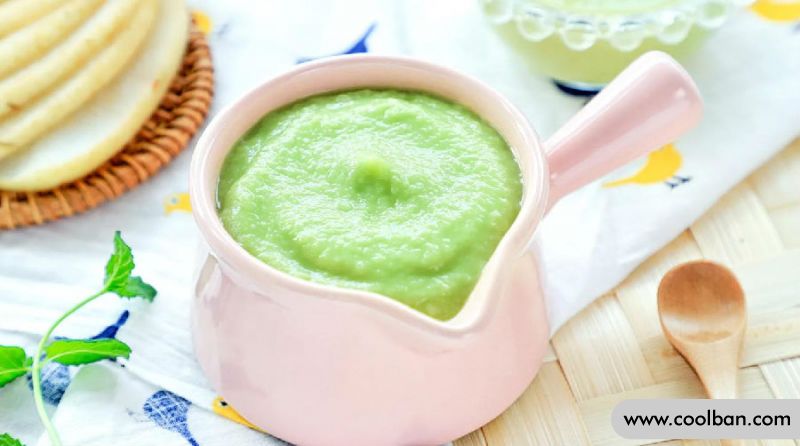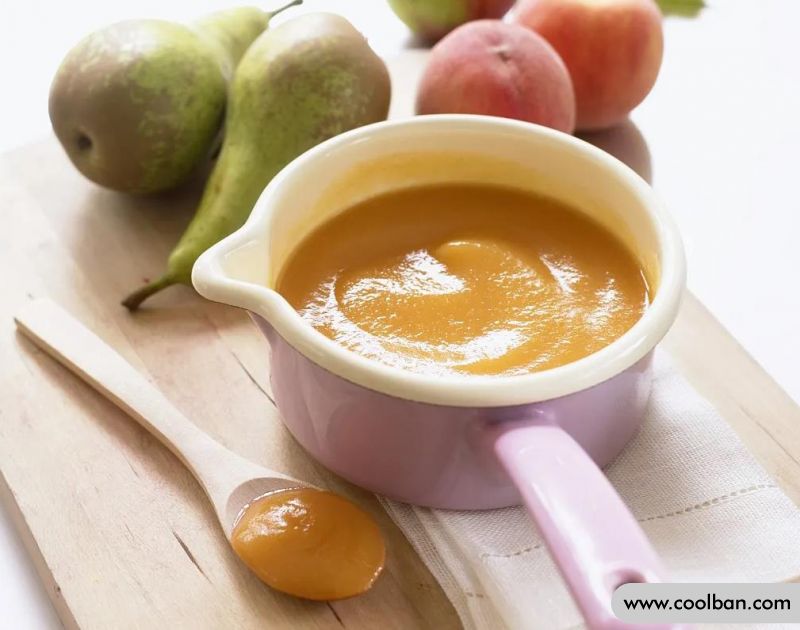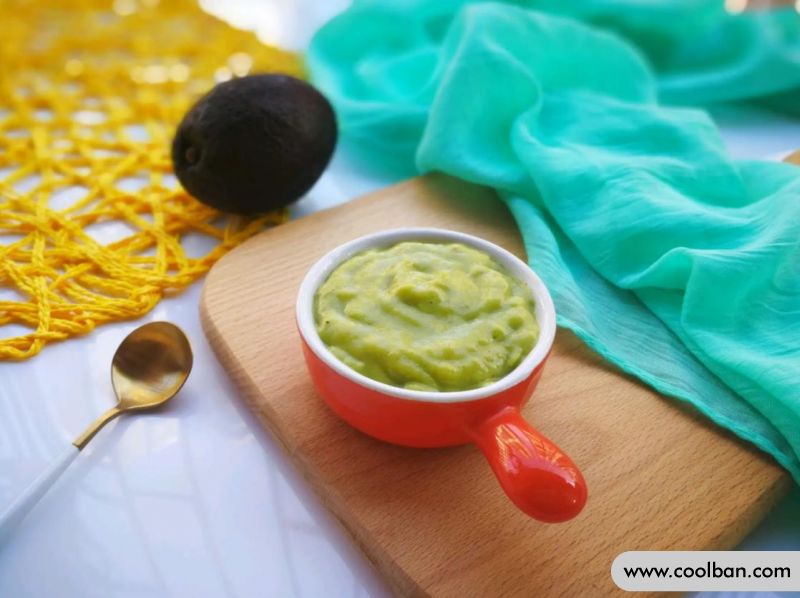How old can a baby eat puree? What puree can't be eaten?
2022-04-15
Puree is a baby food supplement that meets the growth and development needs of babies after four months. Fruit puree has always been loved by parents and children because of its good taste and rich nutrition, so what kind of puree can babies eat? What kind of fruit puree can't baby eat? What are the benefits of baby fruit puree? Let's take a look.

How old can babies eat fruit puree
Generally, it can be used after the baby is four months old. At this time, babies need more nutrients, and exclusive breast milk can no longer meet their physiological needs. Parents need to find some more suitable ingredients so that their children can grow better. Then, the food added at this time is called complementary food. Most of these foods are mainly liquid foods, such as brewing cereals, egg yolks and orange juices, and the fruit purees recommended here.
What are the benefits of eating puree for babies
In general, the benefits of puree for babies are as follows: Vitamin supplementation can help keep your baby's gut moist. Hygienic, healthy, nutritious puree is like eating fresh fruit.
The quality is stable, the taste is pure, and the taste is guaranteed to be consistent, pure and natural, much better than ordinary freshly squeezed juice. Variety of tastes and variety. Mom can do it herself. The operation is simple, convenient and fast, and the baby likes it very much. Mothers should pay attention, most of the juices on the market are artificially formulated fruit powders, concentrated juices, and flavors. Drinking such juices poses health risks to the human body. Although most bottled juices contain these additives, they all have strict dosage controls. However, it is difficult to control the dosage of artificially prepared fruit juice due to manual operation, which often leads to the content of additives exceeding the standard. Regular drinking will cause different degrees of harm to the human body. The process used in fruit puree does not require any chemical substances such as preservatives, flavors, and pigments. The fundamental difference is that puree is another form of fresh fruit. The concentrated juice, pulp, etc. are all operated manually, resulting in the loss of added or nutritious taste. So it's better to make your own.
In Europe, America, Japan and South Korea, fruit puree is mainly used in restaurants, hotels and street juice bars, as raw materials for fruit juice or in bars to prepare cocktails, fruit oil tea, fruit fresh milk, etc. Fruit puree is also a baby food supplement. Usually, when feeding your baby, puree can be mixed with purified water, added to other complementary foods, or eaten directly. There are many kinds of common baby puree, such as: peach puree, pumpkin puree, apple puree, and many mixed fruit puree or fruit and vegetable puree, such as: apple pumpkin red date puree.

What puree is good for baby to eat
1. Apple
Apple is a very common fruit in life, and its nutritional value is very high. Apples are warm in nature, so apples are a good choice for children with weak stomachs to treat symptoms of indigestion. Most importantly, apples contain a variety of vitamins, minerals, organic acids and fruit acids to meet your baby's needs. Bacteria in a baby's mouth can cause tooth decay or gingivitis, which is a constant worry for mothers. The active substances in apples can help kill bacteria in your baby's mouth. Not only that, it is also effective in preventing rickets in babies in advance. Mothers can also mash it into mud, heat it and feed it to the baby, and it can also treat indigestion.
2. Banana
Mothers have always believed that bananas are used for laxatives. Only when babies are constipated will they be willing to make mashed bananas to help them defecate. In fact, this common fruit also has high nutritional value. It contains a variety of trace elements and vitamins, which are beneficial for children to increase their appetite and enhance their resistance.
3. Papaya
Many mothers know very little about papaya. Actually papaya tastes good. By feeding papaya puree, the baby can get rich VC and dietary fiber.
4. Cantaloupe
If it is in the hot summer, mothers may wish to give the baby a taste of cantaloupe puree. If your baby has bad breath, don't panic, cantaloupe can help ease the problem. Of course, the iron rich in cantaloupe can also help mothers to solve the problem of anemia in their babies. Not only that, it is rich in protein, dietary fiber, carotene, and vitamins, which also play a very important role in the growth and development of children.

What are the purees that babies can't eat?
1. Persimmon
Persimmons contain persimmons, gums and tannins. If you eat sweet potatoes or crabs at the same time as persimmons, several components in persimmons will form hard lumps, which are not easy to dissolve in the stomach. . So mothers be careful.
2. Pineapple
When adults eat pineapple, most people will have a feeling of numbness in the tongue, which shows that pineapple has a certain irritant. For babies, bromelain, etc. are all great threats. It irritates blood vessels in your baby's skin. If the baby is sensitive, there will be numbness in the hands, feet, mouth, tongue, and itchy skin.
3. Mango
Mango puree has always been mom and baby's favorite fruit puree. Mothers here should pay attention, mangoes often contain some irritating substances. After the baby eats, the skin and mucous membranes will be irritated to a certain extent. In severe cases, your baby may develop symptoms of contact dermatitis of the lips.
4. Hairy fruit
Fruits such as kiwi fruit and peaches are considered to have high nutritional value, and kiwi fruit is also recognized as the "king of fruits". Of course, when mothers consider nutrition, they also need to consider whether these fruits are suitable for babies to eat. These fluffy fruits contain a lot of macromolecules. These macromolecular substances test the gastrointestinal function of the human body very much. The baby's gastrointestinal function is very weak and cannot digest these substances, which can easily cause allergic reactions.

How old can babies eat fruit puree
Generally, it can be used after the baby is four months old. At this time, babies need more nutrients, and exclusive breast milk can no longer meet their physiological needs. Parents need to find some more suitable ingredients so that their children can grow better. Then, the food added at this time is called complementary food. Most of these foods are mainly liquid foods, such as brewing cereals, egg yolks and orange juices, and the fruit purees recommended here.
What are the benefits of eating puree for babies
In general, the benefits of puree for babies are as follows: Vitamin supplementation can help keep your baby's gut moist. Hygienic, healthy, nutritious puree is like eating fresh fruit.
The quality is stable, the taste is pure, and the taste is guaranteed to be consistent, pure and natural, much better than ordinary freshly squeezed juice. Variety of tastes and variety. Mom can do it herself. The operation is simple, convenient and fast, and the baby likes it very much. Mothers should pay attention, most of the juices on the market are artificially formulated fruit powders, concentrated juices, and flavors. Drinking such juices poses health risks to the human body. Although most bottled juices contain these additives, they all have strict dosage controls. However, it is difficult to control the dosage of artificially prepared fruit juice due to manual operation, which often leads to the content of additives exceeding the standard. Regular drinking will cause different degrees of harm to the human body. The process used in fruit puree does not require any chemical substances such as preservatives, flavors, and pigments. The fundamental difference is that puree is another form of fresh fruit. The concentrated juice, pulp, etc. are all operated manually, resulting in the loss of added or nutritious taste. So it's better to make your own.
In Europe, America, Japan and South Korea, fruit puree is mainly used in restaurants, hotels and street juice bars, as raw materials for fruit juice or in bars to prepare cocktails, fruit oil tea, fruit fresh milk, etc. Fruit puree is also a baby food supplement. Usually, when feeding your baby, puree can be mixed with purified water, added to other complementary foods, or eaten directly. There are many kinds of common baby puree, such as: peach puree, pumpkin puree, apple puree, and many mixed fruit puree or fruit and vegetable puree, such as: apple pumpkin red date puree.

What puree is good for baby to eat
1. Apple
Apple is a very common fruit in life, and its nutritional value is very high. Apples are warm in nature, so apples are a good choice for children with weak stomachs to treat symptoms of indigestion. Most importantly, apples contain a variety of vitamins, minerals, organic acids and fruit acids to meet your baby's needs. Bacteria in a baby's mouth can cause tooth decay or gingivitis, which is a constant worry for mothers. The active substances in apples can help kill bacteria in your baby's mouth. Not only that, it is also effective in preventing rickets in babies in advance. Mothers can also mash it into mud, heat it and feed it to the baby, and it can also treat indigestion.
2. Banana
Mothers have always believed that bananas are used for laxatives. Only when babies are constipated will they be willing to make mashed bananas to help them defecate. In fact, this common fruit also has high nutritional value. It contains a variety of trace elements and vitamins, which are beneficial for children to increase their appetite and enhance their resistance.
3. Papaya
Many mothers know very little about papaya. Actually papaya tastes good. By feeding papaya puree, the baby can get rich VC and dietary fiber.
4. Cantaloupe
If it is in the hot summer, mothers may wish to give the baby a taste of cantaloupe puree. If your baby has bad breath, don't panic, cantaloupe can help ease the problem. Of course, the iron rich in cantaloupe can also help mothers to solve the problem of anemia in their babies. Not only that, it is rich in protein, dietary fiber, carotene, and vitamins, which also play a very important role in the growth and development of children.

What are the purees that babies can't eat?
1. Persimmon
Persimmons contain persimmons, gums and tannins. If you eat sweet potatoes or crabs at the same time as persimmons, several components in persimmons will form hard lumps, which are not easy to dissolve in the stomach. . So mothers be careful.
2. Pineapple
When adults eat pineapple, most people will have a feeling of numbness in the tongue, which shows that pineapple has a certain irritant. For babies, bromelain, etc. are all great threats. It irritates blood vessels in your baby's skin. If the baby is sensitive, there will be numbness in the hands, feet, mouth, tongue, and itchy skin.
3. Mango
Mango puree has always been mom and baby's favorite fruit puree. Mothers here should pay attention, mangoes often contain some irritating substances. After the baby eats, the skin and mucous membranes will be irritated to a certain extent. In severe cases, your baby may develop symptoms of contact dermatitis of the lips.
4. Hairy fruit
Fruits such as kiwi fruit and peaches are considered to have high nutritional value, and kiwi fruit is also recognized as the "king of fruits". Of course, when mothers consider nutrition, they also need to consider whether these fruits are suitable for babies to eat. These fluffy fruits contain a lot of macromolecules. These macromolecular substances test the gastrointestinal function of the human body very much. The baby's gastrointestinal function is very weak and cannot digest these substances, which can easily cause allergic reactions.
